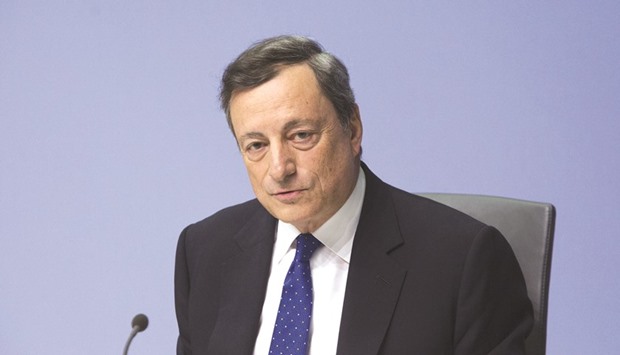Mario Draghi’s German problem has come back to haunt him.
In a week that revealed a jump in inflation in Europe’s largest economy, commentators are lining up to urge the European Central Bank president to end his ultra-loose monetary policy. From the allegation that savers face devastation to Bild newspaper’s call to “Raise rates now!” Draghi is once again facing the wrath of Germans fretting that the guardian of price stability will let them down.
“The debate is going to get louder, particularly in Germany where people are bred to fear inflation,” said Stefan Kipar, an economist at BayernLB. “But one mustn’t forget that the ECB is setting monetary policy not only for Germany, but for the whole euro area, and that even in Germany the underlying price- pressure remains moderate and inflation should stay below 2% in the upcoming year.”
As Germans started the new year, Tuesday brought a reminder of just how strong their economy is looking. The number of jobless fell more than forecast in December, with the unemployment rate holding at a low of 6%, and inflation posted a record increase to 1.7% from 0.7%. While surging energy costs drove much of the price gains, food and goods also got more expensive. Factory-orders data published yesterday pointed to a revival of manufacturing demand.
Within an hour of the inflation data, Clemens Fuest, president of the Munich-based Ifo research institute, called on the ECB to consider ending its bond-buying in March. The Governing Council decided last month to extend the program until at least the end of 2017.
Bild, the nation’s most-read newspaper, said in an opinion piece that with interest rates on deposit accounts near zero, people “are seeing a net devaluation of their savings while governments in euro countries can continue borrowing at historically low costs.” It urged Draghi to apply the same “vehemence” to protecting savers as he used to defend the euro.
It wasn’t alone. Business daily Handelsblatt reported that Germans could lose tens of billions of euros a year on the real value of their savings, which Bavarian Finance Minster Markus Soeder told the paper is “devastating.”
Germany has frequently been a thorn in Draghi’s side, with the Bundesbank and German appointees to the Executive Board tending to push back against loose policies.
The ECB has also been a political target in the country, which holds elections this year and where populist parties have gained ground. Finance Minister Wolfgang Schaeuble has suggested that Draghi’s policies share the blame for that trend.
The ECB head took his argument to German lawmakers in a closed-door session in Berlin in September, where he acknowledged the pain his policies are bringing to some of Europe’s savers but vowed to press on with his efforts to bring back price stability for the euro area as a whole.
Figures published the day after the German data showed consumer-price growth in the currency bloc at 1.1% in December, almost twice as fast as the previous month but still well below the goal of just under 2%. The ECB predicts euro-area inflation won’t reach that target until at least 2019.
While Bundesbank President Jens Weidmann hasn’t yet commented on either the German or euro-zone figures, he has repeatedly expressed skepticism of the need for ever-looser policy.
“We must act in a forward-looking way,” he said in an interview with Bild published on December 26. “That means to tighten the reins as soon as inflation begins to be on a sustainable path to our goal.”
That augurs more tension for Draghi. The Governing Council next sets policy on January 19.
Draghi: Facing wrath.

DRAGHI
